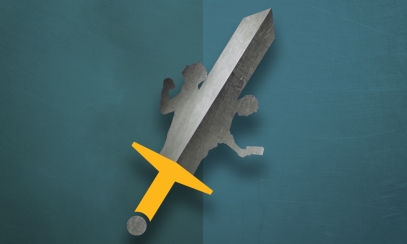
Is there a man about the house?
Getting your Trinity Audio player ready...It is significant that in this month’s issue of FAITH Magazine we have two articles focused on men — the IGNITE Men’s Conference on page 10 and J.R.R. Tolkien on fatherhood on page 12. Some say that nowadays there is a “crisis of masculinity,” which is probably why there are now so many events, Catholic and otherwise, geared to bolstering the identity of men in our modern world. If there is such a crisis, we could ask the question: why?
It is significant that in this month’s issue of FAITH Magazine we have two articles focused on men — the IGNITE Men’s Conference on page 10 and J.R.R. Tolkien on fatherhood on page 12. Some say that nowadays there is a “crisis of masculinity,” which is probably why there are now so many events, Catholic and otherwise, geared to bolstering the identity of men in our modern world. If there is such a crisis, we could ask the question: why?
The 20th century was responsible for an astonishing amount of damage to men. The two world wars alone wiped out a large chunk of the males from those generations through the carnage of the conflicts. In his first public statement as pope in September 1915, the newly elected Benedict XV declared he was “stricken with inexpressible horror and anguish before the monstrous spectacle of this war with its streams of Christian blood.”
Estimates indicate that at least 8.5 million men died in World War One, while over 21 million perished in World War Two. What effect this had on the male psyche is anyone’s guess. But here’s mine — and it is only a guess.
When those young men went off to wholesale slaughter in the trenches of Europe between 1914 and 1918, that left their wives in charge of the families they left behind. Many of those women became the breadwinners by working in munitions factories and other ancillary services. When the survivors returned after the armistice, many were suffering from shell shock and had limited capacity to take up life where they left off, including competently carrying out responsibilities as fathers to their children. The effect that must have had on sons in particular was to hold up a damaged role model of what it meant to be a man. It also resulted in the wives continuing to shoulder the heavy load of caring for the family.
The same thing would have happened in the second conflict between 1939 and 1945. Tolkien must have been aware of these dangers and that’s possibly why he spent a lot of his free time writing to his sons to give them guidance and support in their roles as maturing men.
The overall effect of all of that on the self-image of men seems to have been devastating and probably propagated down the subsequent generations. Today, it is not unusual to find many men whose adolescence seems to stretch all the way to their 30s and even 40s, with a general reluctance to take responsibility. The prevalence of internet pornography and video games also seem to have further stunted psychological and emotional growth, allowing men to live in a virtual world where they are heroes and masters of all that they survey. Perhaps that is also a contributing factor in the difficulty many young men find in dating effectively.
This erosion or destruction of the identities of men and women has a demonic feel to it. Being either a man or a woman lies at the essence of what it means to be a human being, because that’s the way that God created us: male and female. And ever since the Garden of Eden, Satan has been trying to destroy the human race through lies about who we truly are.
The temptation for men is to become either feminized on the one extreme, or brutish on the other. Neither is a true reflection of the nature of a man. That being the case, where do we find a healthy image of masculinity that men can aspire to? The answer is in Jesus Christ, “who, though he was in the form of God, did not count equality with God a thing to be grasped, but emptied himself, taking the form of a servant, being born in the likeness of men; and being found in human form he humbled himself and became obedient unto death, even death on a cross.” (Phil 2:6-8)
That element of personal sacrifice may well be a key to starting out on the road to healthy masculinity. It may, in fact, be the ultimate weapon in the spiritual battle for the true identity of men.



